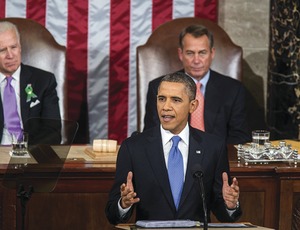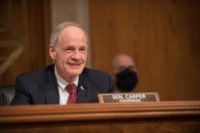
Construction officials were pleased to hear President Obama make a pitch in his State of the Union speech for more federal funds for infrastructure. But the proposed $50-billion infusion is similar to one Obama floated in 2011 and 2012. Congress didn't adopt those earlier proposals; with federal spending still under heavy pressure, Obama's new request for public-works dollars will be a tough sell.
In his Feb. 12 speech, Obama called for a "Fix It First" program to "put people to work as soon as possible on our most urgent repairs," including structurally deficient bridges. Fix It First would account for $40 billion of an envisioned $50-billion up-front supplement to current federal infrastructure aid, according to a White House background document.
David Bauer, American Road & Transportation Builders Association senior vice president, says, "I think that, unquestionably, $50 billion in additional infrastructure investment would help the marketplace, would put people to work, would deliver transportation improvements. But if something like that is done without also addressing the underlying structural problem in the Highway Trust Fund and the resulting impacts … on core highway and public-transportation investment, I think, at best, those additional resources are going to be diluted." Obama didn't offer a plan to deal with the trust fund's chronic shortfalls.
Former Pennsylvania Gov. Edward Rendell (D) said at a Feb. 13 House Transportation and Infrastructure Committee hearing, "We need a short-term [funding] influx … along the lines that the president proposed." But that new money should have a "use it or lose it" deadline by which states must spend the aid or forfeit any unspent sums, he added.
Obama also proposed a "Partnership to Rebuild America," which would use private-sector funds to help upgrade ports, pipelines and schools. Capitol Hill may warm to that idea simply because those dollars wouldn't be Uncle Sam's. Kurt Nagle, American Association of Port Authorities president, says, "We certainly endorse looking at the public-private partnership aspect of it." Already planned public and private spending on ports is expected to total about $46 billion over the next five years, he notes.
Obama also offered energy proposals, including using federal aid to reward states that construct more energy-efficient buildings. The American Institute of Architects praised that idea.
The president also called for a wide-ranging immigration bill, including border security and a "pathway to earned citizenship." Geoff Burr, Associated Builders and Contractors vice president of government affairs, called Obama's proposal "a positive step," but added that "we are disappointed that he neglected to address the need for a temporary guest-worker program for non-agriculture year-round skilled workers."



Post a comment to this article
Report Abusive Comment